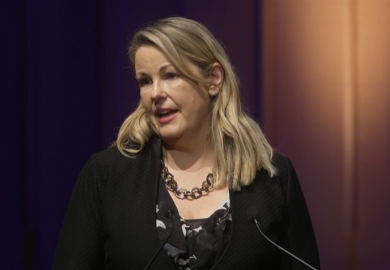Average pay packages for vice-chancellors at UK universities have increased by £40,000 – to over £340,000 – in just three years, according to Times Higher Education analysis.
Of the 121 members of Universities UK to have released financial accounts to date, the median total remuneration for vice-chancellors was £340,901 in 2023-24 – a 4 per cent rise from £327,000 the year before, and up from £311,000 in 2021-22.
The sector-wide pay rise for rank-and-file higher education staff in 2023-24 was 2 per cent or, if it was higher, £1,000.
The latest figures mean that the average total pay package for university leaders has risen by about £40,000 (13 per cent), from £302,917 in 2020-21.
As THE has already revealed, the largest total pay packages were £694,000 at the University of Leeds and £595,000 at London Metropolitan University – both of which included sizeable exit packages to departing leaders.
Another hefty payout came at St George’s, University of London, where departing vice-chancellor Jenny Higham was awarded compensation for loss of office of £217,433 – and £507,357 overall. That came as St George’s merged with City, University of London, to form City St George’s, University of London, led by Anthony Finkelstein.
The £577,000 total remuneration for Deborah Prentice at the University of Cambridge, which included £42,000 in relocation expenses, was the largest annual increase (16 per cent) across the sample – when institutions with more than one leader in 2023-24 are excluded.
Cambridge said it needed to attract and retain high-performing leaders as one of the top universities in the world.
The news comes amid widespread concern over the financial health of the sector, and separate THE analysis which showed that more than £200 million was spent on severance pay in 2023-24.
The 121 universities in the sample spent £42.4 million on vice-chancellor remuneration last year – and a total of £160.4 million across the past four years.
“University staff and students will rightly be sickened to see vice-chancellors taking home bumper pay cheques as they simultaneously embark upon a spree of sackings and course closures,” said Jo Grady, general secretary of the University and College Union.
“Whenever vice-chancellors say difficult decisions must be made and belts must be tightened, they should begin by addressing their own inflated salaries.”
In terms of salaries, François Ortalo-Magné, dean of London Business School, had the highest of all in this group by a long way – £533,000. This was almost twice as large as the median across all UUK vice-chancellors, of £283,000.
Average salaries rose 4 per cent from £272,000 the year before, and 12 per cent from £252,747 in 2020-21.
As might be expected, Oxbridge leaders also have salaries at the top of the list – with £410,000 at Oxford and £409,000 at Cambridge – but both were surpassed by Gerry McCormac, vice-chancellor of the University of Stirling.
He received a base salary of £414,000 last year – the second highest among the sample of almost 90 per cent of UUK members.
McCormac’s 14 per cent annual salary rise was among the largest raises across the sector, but the institution said it came after he declined an increase above the national pay award in eight of the previous 10 years.
Nishan Canagarajah at the University of Leicester also received a 14 per cent salary uplift – taking home £328,000 in base pay, and £337,000 overall. This came after a record number of applications and record-breaking research award funding for the institution in 2022-23, Leicester said.
Victoria Nairn’s salary at the University of the Highlands and Islands fell to £189,000 last year and was the lowest among the group. The difference between her salary and that of Ortalo-Magné was the widest for at least the last four years.
Richard McManus, professor of economics at Canterbury Christ Church University, said the results were very consistent with his own research – that the benchmarking process for vice-chancellor pay led to a faster acceleration than for other staff members.
“Institutions at the lower and medium end of the pay distribution benchmark primarily against institutions with larger v-c pay than themselves,” he said.
“The institutions at the higher end of the pay distribution benchmark primarily towards performance parameters. This leads to a ratcheting up of pay for v-cs.”
McManus said “strategic selection” of what is an appropriate benchmark has led to pay of vice-chancellors outstripping those of the typical worker.
And despite the optics, he said the current financial crisis will be used by vice-chancellors to negotiate for higher pay – while simultaneously being the reason behind redundancies elsewhere.
The median pay package across the Russell Group was £397,000, though many of the largest pay packages came from outside this group. Seven of the top 10 largest pay packages came from institutions based in London.
Register to continue
Why register?
- Registration is free and only takes a moment
- Once registered, you can read 3 articles a month
- Sign up for our newsletter
Subscribe
Or subscribe for unlimited access to:
- Unlimited access to news, views, insights & reviews
- Digital editions
- Digital access to THE’s university and college rankings analysis
Already registered or a current subscriber?








